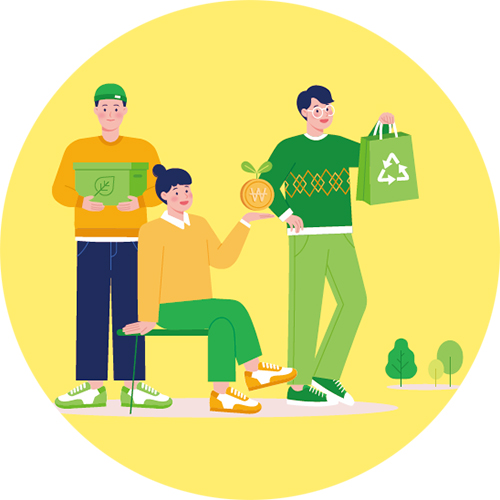
Economics textbooks teach the readers to carefully consider the price when purchasing a product to enjoy maximum utility on a limited budget. However, books cannot explain everything. In the consumption culture of the younger generation, some factors, such as personal values and moral issues, affect people’s consumption as much as the price of products or services.
When you search on the Internet to buy something, there are many products from many companies. However, among many companies, there are particular types of companies mostly selected by Gen MZ. “Value consumption” has become an essential factor in the consumption decision process among Gen MZ.
Value consumption refers to the consumption behavior that expresses one’s value in a way that only consumes what can satisfy the value one wants to pursue. Value consumption also includes “ethical consumption,” which consumes products from ethical companies and “green consumption,” which consumes eco-friendly products. According to a survey of 1,500 men and women in their 20s to 60s nationwide by Lotte Members in May 2022, about 83.5 percent of respondents said they had consumed according to the value they pursued.
Unlike in the past, when cost-effectiveness and rationality were pursued, people’s consumption culture has changed to value consumption. In particular, Gen MZ, born between the early 1980s and early 2000s, said they experienced relatively active consumption types. They buy products from companies that donate part of the profits, protect animals, or act in way beneficial to society.
As such, at the purchasing stage, consumers examine what ethical steps companies take socially. If the ideology the company wants to pursue and the consumers’ values fit, it will lead to consumption. In other words, Gen MZ prefers to express their values by consuming products or services from companies with similar goals, even if they have numerous alternatives. In addition, if one’s consumption directly benefits society, it increases consumers’ willingness to buy.
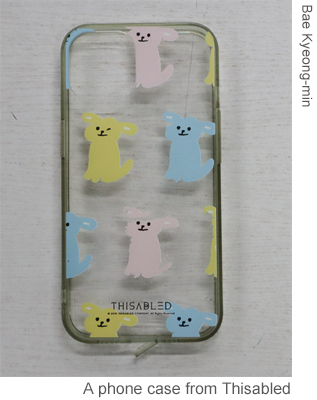
“Freitag” from Switzerland is a representative upcycling brand. It uses old truck tarpaulin as its base fabric to make Freitag’s bag, adding rubber from bicycle wheels and waste car seat belts. Worn-out things are reborn as the only bags in the world by Freitag with practical and urban use. Due to the nature of the material, each product must be made by hand, so the price is somewhat high, but it is receiving much attention from Gen MZ. “Thisabled” from Korea provides a foundation for artists with developmental disabilities to become socially and economically independent through continuous artistic activities.
Developmental disability usually includes autism and intellectual disability, and it is one of the disabilities that make difficult to get a job because people with the developmental disabilities are not easy to adapt to social rules due to their inborn difficulties. This brand not only exhibits works by artists with developmental disabilities but also produces and sells various lifestyle products. It is a company that considers the happiness of artists with developmental disabilities the most important and attracts people with the same values.
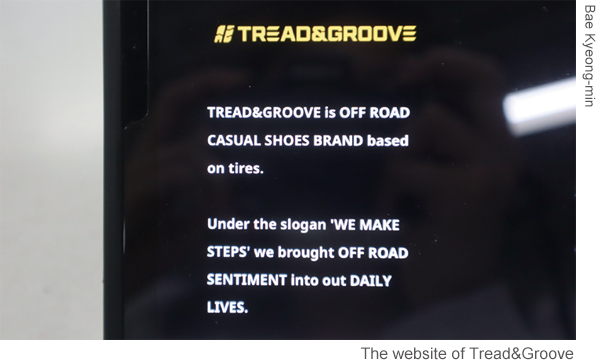
Students from the University of Seoul (UOS) have also set up companies to realize people’s value consumption. “Tread&Groove” is an upcycling shoe manufacturing and sales company. Pollution and environmental problems caused by waste tires are serious, but tires that withstand heavy weight and fast-speed cars can be used for soles of shoes to make products with excellent grip and durability. With the recent Environmental, Social, and Governance (ESG) investing trend, Tread&Groove is getting a lot of attention.
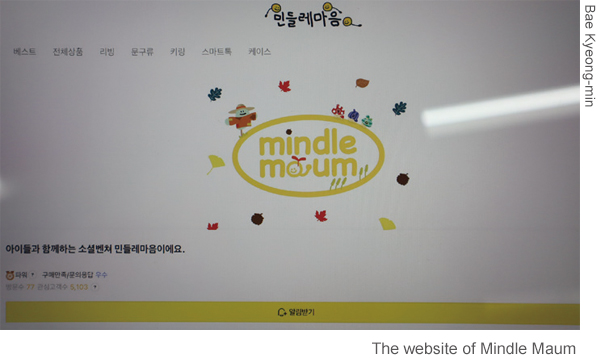
Within eight minutes of Wadiz’s funding, the target amount was 100 percent achieved, and about 1,200 percent of the crowdfunding target amount was achieved. “Mindle Maum” produces and sells goods based on pictures drawn by seriously ill children. It contributes to introduce people about the pediatric and adolescent temporary care team. In addition, it regularly delivers play kits and donations to pediatric wards so that patients and their families can live in the wards more comfortably. Not only individual consumers but also institutions such as hospitals pay a lot of attention to and support this brand.
Value consumption does not simply end with one consumer’s consumption. Through consumption, they identify themselves with the company, feel solidarity with it, and switch themselves to loyal customers. In addition, if value consumption is revealed to Gen MZ’s social media, it takes on the character of a campaign to express its value. Exposure through social media to other consumers who pursue the same value leads to chain consumption.
According to a survey of 1,000 men and women born between 1955 and 2003 nationwide by research company Embrain, respondents said that the sharing/donation campaign posted on social media is effective. They said the campaign drew more people’s participation and interest and had a definite promotional effect. Through 72.4 percent of the respondents’ answers, it is expected that social media can be used as a tool for good consumption activities. Value consumption is currently changing to a sustainability-based form along with companies’ ESG management methods.
Consumers no longer feel the value of spending if they lose trust in the company or feel that the company’s ideology does not align with theirs, no matter how good quality products and services they provide.
Sometimes, consumers practice value consuming by not consuming. While the majority of value consumption is done by spending more on ethical products or services, spending less, if not not at all, on unethical goods or goods from unethical companies can be a value consumption in a broad sense.
The most recent boycott case in Korea is against the SPC Group. SPC Group is one of the major corporate groups in the domestic food and beverage industry that undoubtedly owns the biggest and most popular bakery chain in Korea. Although it was successful in terms of market shares and size, the company has suffered huge blame from consumers after a tragic incident, a death of a young worker.
On October 15, 2022 a 23-year-old employee working in the sauce production chain owned by SPL, one of the SPC’s subordinate companies, accidentally got her uniform caught in the sauce agitator. She got pressed between the machine and the agitator—with no emergency stop installed—continued to operate.
The employee was suffocated to death, and it was later found that the machine did not meet the safety standards of the Ministry of Employment and Labor (MOEL). Seven of the nine agitators lacked the emergency stop, and MOEL ordered the suspension of work on the seven machines.
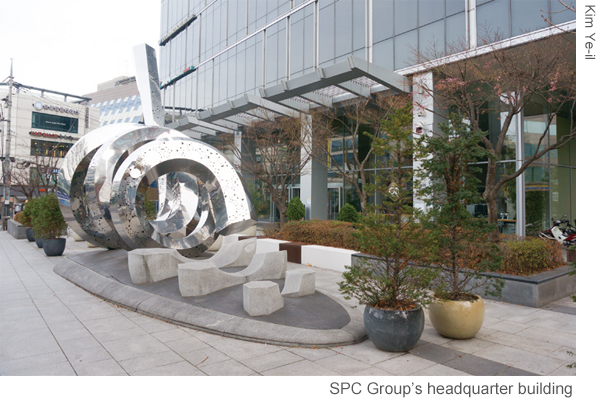
Poor working conditions and illegal machine use began SPC’s problems. Right after the day of the accident, the company continued to operate the production chain and ordered all its employees, including the workers who witnessed the traumatic death of their colleague, to continue working as usual.
Having been informed of the company’s decision, MOEL ordered the suspension of work on the two remaining agitators and advised suspension on the whole floor. The news that SPC hardly put its employees’ trauma into regard and forced them to work infuriated everyone nationwide.
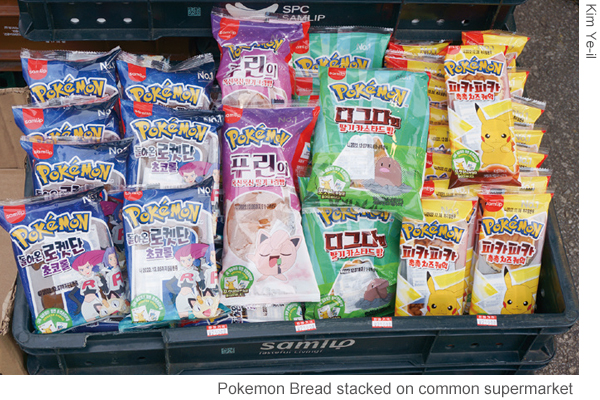
The neglect of the workers’ working conditions was revealed once again at the funeral of the dead employee. On October 20, SPC reportedly sent bread boxes from one of its brands.
The series of incidents that showed SPC’s insensitivity toward the employees led numerous people to participate in a boycott against the company. The impact of the boycott was significant. The sales of SPC’s Paris Baguette, the bakery chain with the most branches in Korea, dropped by 30 percent compared to last year. The stock price of SPC Samlip, SPC’s only company listed on the Korea Composite Stock Price Index (KOSPI) Market, dropped by 12 percent a week after the incident.
People could feel the impact of the boycott in their daily lives. Samlip, SPC’s packaged baked goods producer, relaunched “Pokemon Bread” in early 2022. The product was soon a mega-hit. It became so popular that the “scarcity of Pokemon Bread” was a major social buzz in 2022. Every retail store ran short of the product, and fans of Pokemon hunted from store to store to buy one of the pastries. However, a week after the boycott started, the sales of Pokemon Bread decreased by ten percent. As of December 2022, it is by no means rare to find one of the products in any convenience store.
As influential as boycotts in Korea are, collective consumer action bears controversies. Boycotts by individuals are limited to consumer products, which means boycotts have only a limited impact on companies operating business-to-business in an economic sense. SPC is one of those companies that hold dominance in both the business-to-consumer sector and the business-to-business (B2B) sector. While people can protest by not buying their bread, ice cream, or donut, the sales of flour or unbaked goods may stay the same even during the boycott.
The unbalance between “what consumers can boycott” and “what consumers cannot” leads to another problem. The company’s headquarters, which holds direct responsibility for unethical decisions, can persist with B2B sales. However, owners and employees of each franchise store who live off B2C sales cannot. Therefore, boycotts risk only threatening the lives of the low-level members of the whole business, while the executives may wait for the action to be over instead of correcting their unethical behaviors.
All in all, practicing value consumption is not a rational decision in an economic sense. Some value consumers might have to pay a higher price for the same or even inferior goods or services. Value consumers who participate in boycotts might have trouble finding alternative products and not spending money on unethical deeds. Nonetheless, the fact that value consumption is trending means that consumers in Korea are having their recognition of morality promoted.
Bae Kyeong-min
mymnbb0@uos.ac.kr
Kim Ye-il
lavieenrose0705@uos.ac.kr

